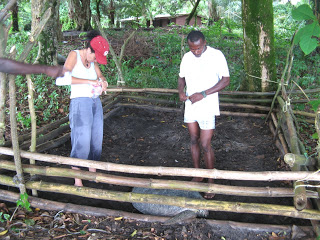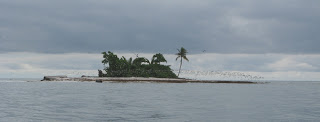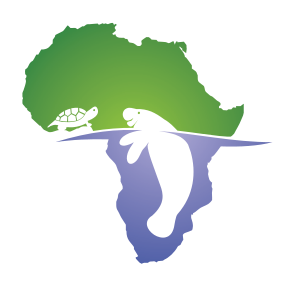Cap Esterias- Part I
First some of the military guys took us out to a sand spit at one end of the island and showed us 3 Ridley nests and a false crawl (the turtle comes up on the beach but decides not to nest, this can be determined by looking at the tracks). They had taken eggs from one nest but had left the others to hatch. After that they took us to a corral where the hunter had a live adult green sea turtle. She was beautiful and Angela estimated her to be about 30 years old (and still not as large as they can get). I was completely overwhelmed by the fact that they were going to kill her and there was nothing I could do to stop it. They’ll sell her meat in Libreville for the equivalent of $50 US, which is a lot of money here, but seems so little for killing such a long-lived and slow-breeding species. They remarked that 5 other turtles had just gone in a boat to Libreville. I wanted to buy it, but Angela said these turtles are residents here, and it would just go back to the same reef and be re-caught by the same fisherman. It was so hopeless I had to walk away from it all. They allowed Angela to take measurements and a genetic sample, and as she did so she was telling the guys that the turtle was 30 years old and only 1 in 1000 hatchlings survive to adulthood. She later told me that the turtle fishermen are willing to give up hunting if there was another way to make money, but this is something that still needs to happen here.
 Angela and Innocent take data on the doomed green sea turtle.
Angela and Innocent take data on the doomed green sea turtle.
After that depressing episode, we left Mbanye and went a short way across the bay to a tiny speck of an island called Cocotier. There are about 3 trees and 500 terns on Cocotier; it is surrounded by rocky ledges and Angela had seen turtles and seagrass there in the past. We snorkeled and I found several patches of Halodule wrightii, a favorite manatee food. Collected samples and photographed them. This is also the only seagrass species recorded for West Africa. I also saw some nice tropical fish, a big sea hare and signs of turtle grazing on algae growing on rocks, but no sign of manatees.

Halodule from Cocotier. The individual plants were larger here than the ones I found at Iguela last year, but the grass beds were much smaller and patchier here.


